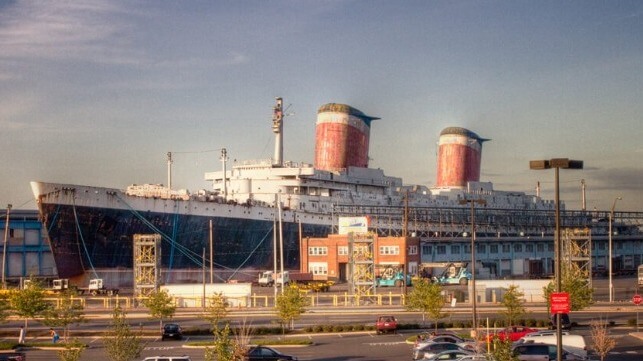Florida County May Consider Buying and Sinking SS United States

After a court order to vacate its longtime berth in Philadelphia, the storied ocean liner SS United States is in need of a new home. Florida's Escambia County has a controversial proposal: a commissioner wants to buy the vessel from its current owners and sink it as a dive attraction. If adopted, the ship's graceful lines would be preserved and accessible to the public; while reefing is not a preferred alternative for the nonprofit conservancy that manages the ship, the other remaining option might be scrapping, a board member warned in a statement last month.
The SS United States was built in 1952 for United States Lines, and was designed to be the fastest transatlantic liner ever delivered. She made good on that promise and still holds the average speed record on the The U.S. government covered about 70 percent of the construction cost on condition that the ship could be requisitioned as a troop transport, and as a result, she was built to U.S. Navy survivability standards. With eight boilers, four steam turbines and four shaftlines, she could develop 240,000 horsepower and attain a top speed of 38 knots (and some claims put it higher). She broke the eastbound and westbound average speed records for a transatlantic crossing on her maiden voyage in 1952, and she still holds both records today.
SS United States operated in commercial service until 1969, when new corporate owners decided to retire her. Though still serviceable, the vessel was costly to operate and had lost money consistently for years. She was passed to the Maritime Administration in 1973, and - like many decommissioned passenger vessels with a storied pedigree - underwent multiple changes in ownership as would-be developers acquired her, then went bankrupt or abandoned their business plans. She was purchased by the SS United States Conservancy in 2011, which had plans to turn her into a waterfront casino, shopping center, museum, hotel or residential complex; though several well-qualified parties entered into serious talks over the years, a permanent buyer has not materialized.
In 2021, the owner of the ship's semipermanent pier in Philadelphia decided to double the daily rent and cancel the lease agreement with the conservancy. This June, after a lengthy court battle, the SS United States lost its case: a judge in a Philadelphia federal court ordered the vessel removed by September 12. So far, the conservancy is still looking for a suitable destination.
Officials in Escambia County, Florida are contemplating whether they might be able to offer a solution: cleaning and sinking the ship, in water shallow enough to attract divers. The location would be near the USS Oriskany, another popular destination off Florida's Gulf Coast. The cost of the proposal would come to about $10 million, but organizers believe that the economic activity from extra visitors would more than pay for the price over the decades to come (with no ongoing expenses like pier rent or maintenance). The county's marine advisory committee has already started fundraising to buy the ship, according to the Pensacola News Journal, and county board member Jeff Bergosh is on board with the idea.
The conservancy's board would prefer to find a pierside home for SS United States, but under the circumstances, it is willing to consider reefing - especially if there could be a shoreside museum nearby to house artifacts from the ship.
"As the Conservancy continues its exhaustive search for possible berths for the ship, we are open to exploring the prospect of reefing as a fallback scenario," the group's board said in a statement. "While converting the vessel into an underwater, artificial reef is clearly not our first choice for the future of America's Flagship, it presents several advantages over scrapping the vessel, including the retention of her economic and tourism potential for those willing to invest in such a scenario."
No comments:
Post a Comment